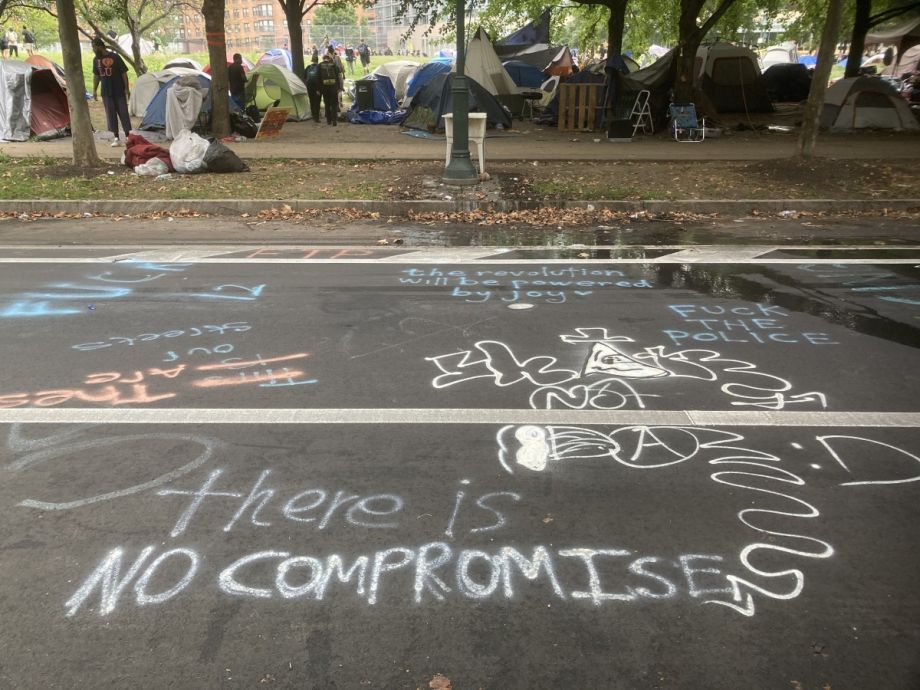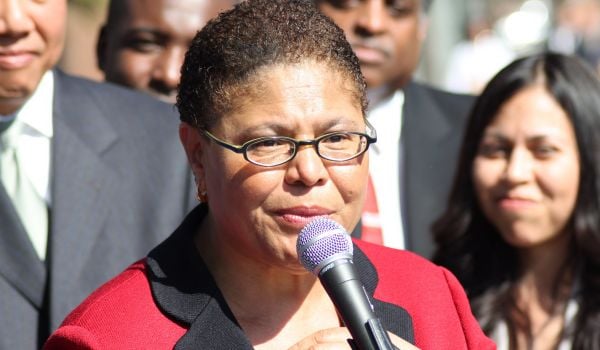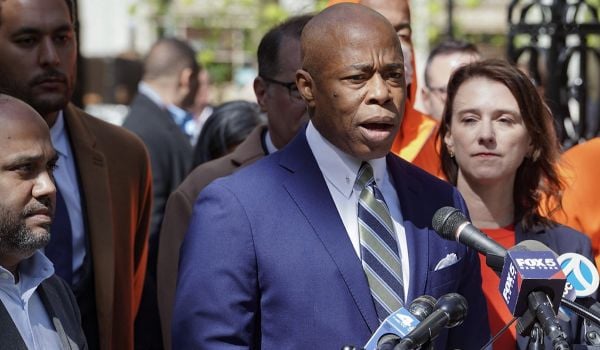Philadelphia Plans Two Tiny-Home Villages
Two villages of tiny homes are planned in Philadelphia after a series of protest encampments elevated concerns about homelessness in the city, according to a report in the Philadelphia Inquirer. The two villages are still in the planning stages. One in Northeast Philadelphia is planned as transitional housing with on-site homeless services, and is expected to include between 12 and 24 small “pods,” 120 square feet each, with heat and electricity but no water or bathrooms, relying instead on a central kitchen, bathroom, and laundry shared among residents, according to the report. The other, in West Philadelphia, will include 24 permanent homes of 400 square feet each with utilities, bathrooms, and kitchens, the report says. The two villages are expected to cost $500,000 and $1.2 million, respectively, according to the story.
A group of protestors and people experiencing homelessness spent much of the summer living on land owned by the city and the Philadelphia Housing Authority, and demanding that vacant homes and property be released into a community land trust, as Next City reported. At the same time, Stephanie Sena, a Villanova professor who had filed a lawsuit to stop an eviction of one of the encampments in August, was working on a plan to bring tiny homes to the city, as the Inquirer previously reported. Sena’s organization is applying to run the West Philadelphia site, the Inquirer reported. Former encampment residents will not get any special priority for the new homes, according to the report.
Oregon Reforms Parking Rules
A state board in Oregon has voted to reduce minimum-parking requirements for new housing construction in many cities across the state, in what is “arguably the biggest state-level parking reform law in US history,” according to a post from the Sightline Institute, a policy and research nonprofit focused on the Pacific Northwest. The vote, from Oregon’s Land Conservation and Development Commission, applies to “middle housing” — small multifamily buildings like duplexes, triplexes, and fourplexes which were legalized in many areas last year — and reduces the number of parking spaces required for new buildings. Under the new rules, according to the post, large metro areas in Oregon may not require more than 1 parking space for the first four attached units in new middle-housing construction. The vote strikes down the parking minimums in eight larger cities, and legalizes duplexes in 22 smaller cities, while preventing those cities from requiring more than one parking spot at each new duplex, the story says. Individual developers can still choose to provide more parking than the minimum requirements as they see fit, the post says, but cities representing more than 60 percent of the state’s population will not be able to increase their requirements beyond a certain amount.
Advocates have long fought to reduce parking requirements in new urban housing development, arguing that it induces demand for cars and increases the cost of housing.
“One-size-fits-all rules—they don’t take into account a lot of context,” said Tony Jordan, the Portland-based founder of the Parking Reform Network, according to the post. “They don’t take into account the fact that there are a lot of households that don’t have cars. They don’t take into account that there’s a lot of existing supply [of parking space] on the streets.”
KCMO Mayor Joins Anti-Eviction Campaign
Housing advocates pushing the circuit court in Jackson County, Missouri, got a boost from Kansas City Mayor Quinton Lucas this week, the Kansas City Star reported. Lucas wrote a letter to the court’s presiding judge asking him to reinstate a moratorium on evictions that the court had put in place earlier in the year but which expired over the summer, according to the report. The Centers for Disease Control has banned many eviction lockouts through the end of the year, but many court systems are still processing evictions.
“The COVID crisis hit Jackson County hard,” Lucas wrote in the letter, according to the report. “Evictions cause serious health and economic crises, exacerbating harms from the pandemic itself. Homelessness and relocation stress add another barrier for the unemployed and working class as they strive to enter the workforce.”
Lucas has been an ally of the Kansas City Tenants movement before. Before he was elected, he scored highest on the group’s candidate questionnaire, and last year, he championed a tenants’ bill of rights that was approved by the city council. According to the Star, KC Tenants has been pushing the court system to stop processing evictions for several months. The courts have responded in the past that they can’t selectively enforce the laws, the Star reported. The circuit court has a new presiding judge, and the tenants’ group and Lucas are asking him to reinstate a moratorium on evictions. Congress is currently negotiating a COVID relief package that could include $25 billion in rental assistance and an extension of the CDC eviction moratorium through the end of January.
This article is part of Backyard, a newsletter exploring scalable solutions to make housing fairer, more affordable and more environmentally sustainable. Subscribe to our weekly Backyard newsletter.

Jared Brey is Next City's housing correspondent, based in Philadelphia. He is a former staff writer at Philadelphia magazine and PlanPhilly, and his work has appeared in Columbia Journalism Review, Landscape Architecture Magazine, U.S. News & World Report, Philadelphia Weekly, and other publications.
Follow Jared .(JavaScript must be enabled to view this email address)


















